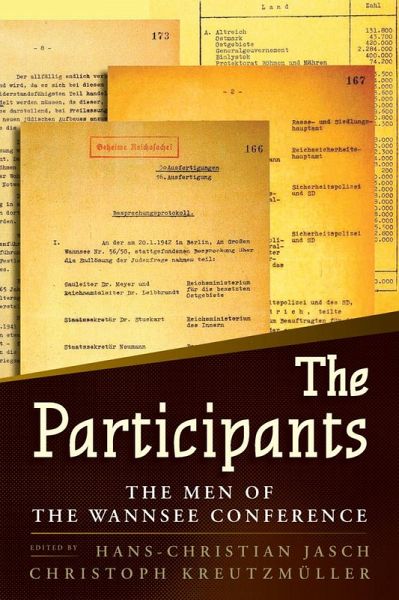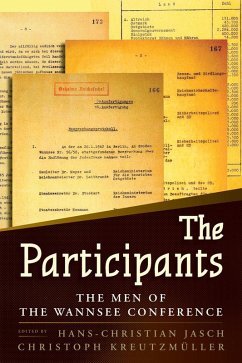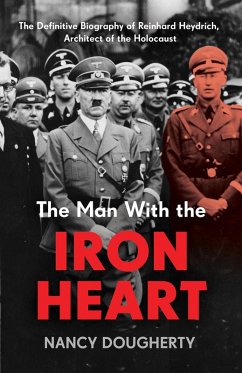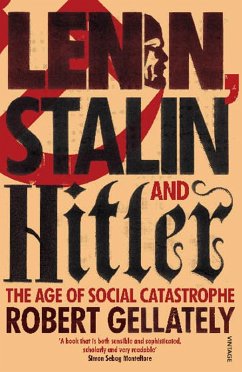
The Participants (eBook, ePUB)
The Men of the Wannsee Conference
Redaktion: Jasch, Hans-Christian; Kreutzmüller, Christoph
Versandkostenfrei!
Sofort per Download lieferbar
15,95 €
inkl. MwSt.
Weitere Ausgaben:

PAYBACK Punkte
8 °P sammeln!
Combining accessible prose with scholarly rigor, The Participants presents fascinating profiles of the all-too-human men who implemented some of the most inhuman acts in history. On 20 January 1942, fifteen senior German government officials attended a short meeting in Berlin to discuss the deportation and murder of the Jews of Nazi-occupied Europe. Despite lasting less than two hours, the Wannsee Conference is today understood as a signal episode in the history of the Holocaust, exemplifying the labor division and bureaucratization that made the "Final Solution" possible. Yet while the confe...
Combining accessible prose with scholarly rigor, The Participants presents fascinating profiles of the all-too-human men who implemented some of the most inhuman acts in history.
On 20 January 1942, fifteen senior German government officials attended a short meeting in Berlin to discuss the deportation and murder of the Jews of Nazi-occupied Europe. Despite lasting less than two hours, the Wannsee Conference is today understood as a signal episode in the history of the Holocaust, exemplifying the labor division and bureaucratization that made the "Final Solution" possible. Yet while the conference itself has been exhaustively researched, many of its attendees remain relatively obscure.
From the introduction:
Ten of the fifteen participants had been to university. Eight of them had even been awarded doctorates, although it should be pointed out that it was considerably easier to gain a doctorate in law or philosophy in the 1920s than it is today. Eight of them had studied law, which, then as now, was not uncommon in the top positions of public administration. Many first turned to radical politics as members of Freikorps or student fraternities. Three of the participants (Freisler, Klopfer and Lange) had studied in Jena. In the 1920s, the University of Jena was a fertile breeding ground for nationalist thinking. With dedicated Nazi, race researcher and later SS-Hauptsturmbannführer Karl Astel as rector, it developed into a model Nazi university. Race researcher Hans Günther also taught there. Others, such as Reinhard Heydrich, joined the SS because they had failed to launch careers elsewhere, and only became radical once they were members of the self-acclaimed Nazi elite order.
On 20 January 1942, fifteen senior German government officials attended a short meeting in Berlin to discuss the deportation and murder of the Jews of Nazi-occupied Europe. Despite lasting less than two hours, the Wannsee Conference is today understood as a signal episode in the history of the Holocaust, exemplifying the labor division and bureaucratization that made the "Final Solution" possible. Yet while the conference itself has been exhaustively researched, many of its attendees remain relatively obscure.
From the introduction:
Ten of the fifteen participants had been to university. Eight of them had even been awarded doctorates, although it should be pointed out that it was considerably easier to gain a doctorate in law or philosophy in the 1920s than it is today. Eight of them had studied law, which, then as now, was not uncommon in the top positions of public administration. Many first turned to radical politics as members of Freikorps or student fraternities. Three of the participants (Freisler, Klopfer and Lange) had studied in Jena. In the 1920s, the University of Jena was a fertile breeding ground for nationalist thinking. With dedicated Nazi, race researcher and later SS-Hauptsturmbannführer Karl Astel as rector, it developed into a model Nazi university. Race researcher Hans Günther also taught there. Others, such as Reinhard Heydrich, joined the SS because they had failed to launch careers elsewhere, and only became radical once they were members of the self-acclaimed Nazi elite order.
Dieser Download kann aus rechtlichen Gründen nur mit Rechnungsadresse in A, D ausgeliefert werden.













